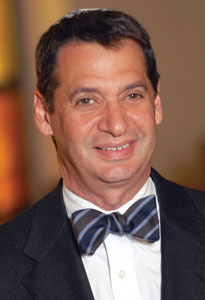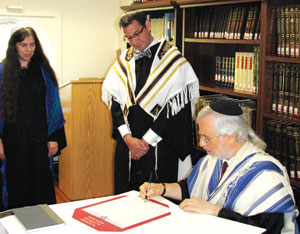 Doug Alpert, the spiritual leader of Congregation Kol Ami, is now officially a rabbi. He received his smicha (ordination) from the Academy for Jewish Religion, on Thursday, May 17, in New York City. He was presented to the Jewish community as a rabbi for the very first time at the ceremony by Rabbi Scott White and Debbie Sosland-Edelman. A large contingent of family and friends also traveled to New York to attend the ceremony. Several former Kansas Citians now living in the New York area were present as well.
Doug Alpert, the spiritual leader of Congregation Kol Ami, is now officially a rabbi. He received his smicha (ordination) from the Academy for Jewish Religion, on Thursday, May 17, in New York City. He was presented to the Jewish community as a rabbi for the very first time at the ceremony by Rabbi Scott White and Debbie Sosland-Edelman. A large contingent of family and friends also traveled to New York to attend the ceremony. Several former Kansas Citians now living in the New York area were present as well.
Kol Ami will honor the occasion of Rabbi Alpert’s ordination at a special worship service Friday, June 8. The service will begin at 7:30 p.m., with an Oneg Shabbat in his honor immediately following. The community is welcome to attend the festivities.
The Kansas City native’s path to the rabbinate was a bit winding. Now 54, he doesn’t know exactly when he began considering the rabbinate, but he thinks it was sometime in the late ’80s or early ’90s. Sometime in the early ’90s he applied to and was accepted to Hebrew Union College-Jewish Institute of Religion.
“I deferred for a year. Then circumstances here in town postponed that indefinitely,” he said.
Before rabbinical school, he practiced law for about three years and served as director of the Kansas City Jazz Commission for about eight years. He also worked in real estate.
Even though he had postponed entrance in rabbinical school, he still wanted to learn more about Judaism. About the time he made that decision, he learned that people in the local Jewish community, including Steve Israelite, were building a relationship with the Siegal College of Judaic Studies in Cleveland. So he enrolled in the distance-learning program and earned a master’s degree in Jewish studies in 2005.
Around this time Rabbi Alpert said he again began considering the possibility of becoming a rabbi. He learned that there was a rabbinical school in New York that offered all its classes on the first three days of the week.
“So I could be here a little more than half the week,” he said.
 He applied to and was accepted to the Academy for Jewish Religion, a pluralist rabbinical school that teaches the full spectrum of Judaism, in 2006. Rabbi Danny Horwitz, who served Congregation Ohev Sholom in the late ’80s and early ’90s, was also ordained from AJR.
He applied to and was accepted to the Academy for Jewish Religion, a pluralist rabbinical school that teaches the full spectrum of Judaism, in 2006. Rabbi Danny Horwitz, who served Congregation Ohev Sholom in the late ’80s and early ’90s, was also ordained from AJR.
Until last year when he finished up his coursework, Rabbi Alpert spent about 30 weeks a year traveling back and forth to New York. This past year while he worked on his thesis and took various exams, he didn’t have to spend as much time in New York.
Even though he hadn’t yet been ordained, he was chosen as the spiritual leader of Kol Ami last summer. Rabbi Alpert just recently renewed his contract with the Reform congregation for another year. He has also worked part-time this year for Congregation Beth Shalom, helping Rabbi Alan Cohen (the rabbi emeritus serving as the interim rabbi this year) when he needed assistance.
“Having this back up has been very important because with the Beth Shalom reorganization that left only Hazzan Menes and me as the clergy and my interim status, there have been times when having another clergy person available has helped immensely. Since Rabbi Alpert grew up in our community and at Beth Shalom, he has a great degree of familiarity with congregants and they with him. I very much appreciate the professional qualities he brings to his work and the skill sets he so admirably demonstrates. I am thrilled to have him join our rabbinic community,” Rabbi Cohen said.
Rabbi Alpert decided to become a rabbi “first and foremost because of the opportunity to be a part of so many meaningful relationships.”
“Part and parcel of this is to be a part of a caring Jewish community,” he said.
He describes himself as a trans/post/multi-denominational Jew.
“Some would argue that denominational Judaism doesn’t carry as much weight or meaning as it once did. We are such a mobile society that you can walk in to any synagogue and everybody has come from somewhere else. So the background of the congregants within any given congregation is pretty diverse,” he said.
“I find something to commend in each of the movements,” he continued.
Up until he took the jobs at Kol Ami and Beth Shalom, he served as the rabbinic intern at Congregation Ohev Sholom.
“I love all the communities I’ve been involved with,” Rabbi Alpert said. “I love my Kol Ami people. I love the Ohev community. Beth Shalom’s going to forever be home; it’s family both literally and figuratively.”
Rabbi Alpert enjoys doing the things rabbis do: worship, Torah learning and study as well as engaging with community in issues of social concern.
“I enjoy being a part of people’s lives,” he said. “People will welcome you into the most meaningful experiences in their lives. It’s a big honor for me,” he said.
Since he’s been working as a spiritual leader for a while, some people had already begun calling him rabbi. But he’s excited to have officially earned the title. Yet he believes it’s a title he will continually have to earn.


